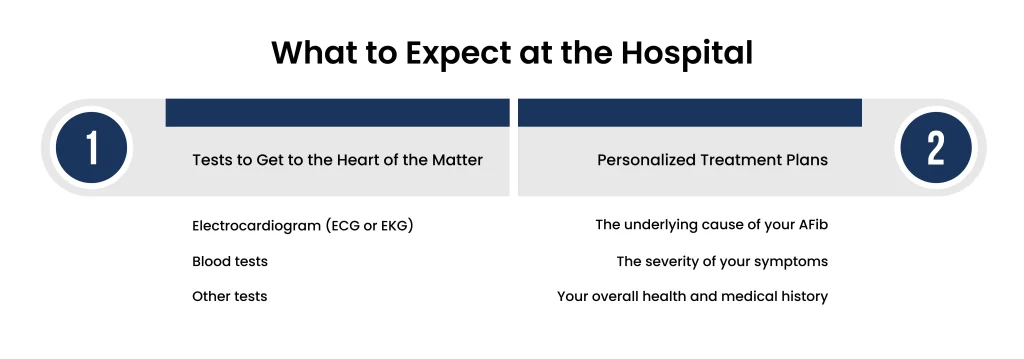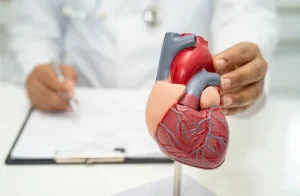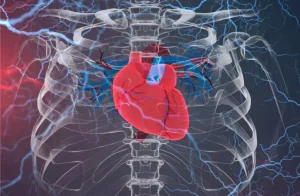Ever feel like your heart is playing a drum solo instead of keeping a steady beat? That fluttery, racing, or pounding sensation might be atrial fibrillation, or AFib for short. It’s like your heart’s rhythm section is improvising a bit too much.
While it might feel a little freaky, AFib is actually pretty common. But here’s the thing: most of the time, it’s not an immediate emergency. However, there are some situations where AFib can be severe and even dangerous. That’s why it’s essential to know when those heart flutters are just a minor inconvenience and when they’re a sign you need to call 911.
Whether you’ve been diagnosed with AFib or you’re just curious about your heart’s health, this guide is for you. Think of it as your own personal decoder ring for your heart’s rhythm, helping you feel more in control and less worried.
So, What Exactly IS Atrial Fibrillation?
In atrial fibrillation (AFib), the heart’s upper chambers (atria) beat irregularly and out of sync with the lower chambers (ventricles). This disrupts the normal, steady rhythm of your heartbeat.
Instead of a consistent “lub-dub” pattern, your heart may feel like it’s:
- Racing: A rapid heartbeat that feels like your heart is pounding or fluttering.
- Skipping: An occasional missed beat or a feeling of your heart “pausing.”
- Flip-flopping: An irregular rhythm that feels like your heart is flip-flopping or quivering.
When AFib Symptoms Spell Trouble
While AFib can sometimes be silent, it often comes with some telltale signs. Recognizing these symptoms is crucial, especially when they signal the need for emergency care.
Common AFib Symptoms:
- Heart palpitations (a fluttering, racing, or pounding feeling in your chest)
- Shortness of breath, even at rest
- Chest pain or discomfort
- Dizziness or lightheadedness
- Fatigue or weakness
When AFib Symptoms Warrant a Trip to the ER:
If you experience any of the following alongside AFib symptoms, it’s time to call 911:
- Severe chest pain: This could be a sign of a heart attack, a life-threatening emergency.
- Fainting or near-fainting: Sudden loss of consciousness or feeling lightheaded and weak could indicate a serious heart rhythm problem or a drop in blood pressure.
- Difficulty breathing that gets worse quickly: If you’re struggling to breathe or your shortness of breath is rapidly worsening, it could signal heart failure or another serious condition.
- Stroke symptoms: Sudden weakness or numbness in your face, arms, or legs, especially on one side of the body, slurred speech, or sudden confusion could all be signs of a stroke, a medical emergency that requires immediate treatment.
If You Have Other Health Conditions:
If you have a history of heart disease, heart failure, or other serious medical conditions, even milder AFib symptoms might warrant a trip to the ER. It’s always better to be safe and get checked out by a doctor.
When AFib Requires Emergency Care
While AFib is often manageable, certain situations require immediate medical attention. Recognizing these critical moments can mean the difference between a minor inconvenience and a serious health risk.
A- First-Time AFib:
If you’re experiencing the telltale signs of AFib for the very first time, it’s natural to feel a bit alarmed. Your heart might be doing things it’s never done before, and that can be a little scary. But rest assured, a first-time AFib episode isn’t always a cause for immediate panic.
The important thing is to pay attention to your body and seek medical attention promptly. A visit to the emergency room (ER) or your doctor’s office will help rule out any other underlying conditions and determine the cause of your AFib. It’s also an opportunity to discuss treatment options and learn how to manage your condition effectively.
Remember, early detection and intervention are key to managing AFib and preventing complications down the road. So, even if your symptoms are mild, don’t hesitate to seek medical advice if you suspect you might be experiencing AFib for the first time.
B- AFib with Underlying Conditions
If you’ve already been diagnosed with certain health conditions, AFib can be a bit trickier. Conditions like high blood pressure, heart disease, diabetes, or thyroid problems can increase your risk of AFib and make it more likely to cause complications.
When you have these underlying conditions, even seemingly mild AFib symptoms can be a red flag. It’s essential to get checked out by a doctor promptly. They can assess whether your AFib is related to your existing condition, adjust your treatment plan if necessary, and monitor you for any potential complications.
Why? Because your underlying health conditions might make you more susceptible to AFib-related complications like blood clots, stroke, or heart failure. Early intervention can help manage your symptoms, adjust your treatment plan if needed, and prevent these serious complications.
C- AFib That Doesn’t Respond to Usual Treatment:
In a case where you are already managing AFib with medication or other treatments, you’ve got a plan in place. But what happens when that plan stops working as well as it used to? Maybe your symptoms are coming back more often, lasting longer, or feeling more intense.
When AFib becomes resistant to your usual treatment, it’s time to consult with your doctor or head to the ER. This unexpected change could signal a few things:
- Your AFib may be progressing: Sometimes, AFib can evolve and become more persistent over time.
- Your current medication may need adjusting: The dosage or type of medication might need tweaking to regain control of your heart rhythm.
- Another underlying condition may be contributing: It’s possible that another health issue is exacerbating your AFib symptoms.
Ignoring these changes can increase your risk of complications like stroke, heart failure, or blood clots. By seeking medical attention promptly, you can work with your doctor to adjust your treatment plan, explore alternative therapies, and get your AFib back on track.
What to Expect at the Hospital
If your AFib symptoms lead you to the emergency room or your doctor’s office, here’s what you can generally expect:

Tests to Get to the Heart of the Matter
- Electrocardiogram (ECG or EKG): This quick and painless test measures your heart’s electrical activity, showing your doctor the rhythm and rate of your heartbeat. It’s the key test for diagnosing AFib.
- Blood tests: These can check for underlying conditions that might be causing or contributing to your AFib, such as thyroid problems or electrolyte imbalances.
- Other tests: Depending on your situation, your doctor might recommend additional tests, such as an echocardiogram (ultrasound of your heart) to check for structural issues or a Holter monitor to track your heart rhythm over time.
Personalized Treatment Plans:
The treatment you receive for AFib will depend on several factors, including:
- The underlying cause of your AFib: If your AFib is triggered by a treatable condition like an overactive thyroid, addressing that condition may help control your heart rhythm.
- The severity of your symptoms: Milder cases of AFib may be managed with lifestyle changes and medication, while more severe cases might require procedures or surgery.
- Your overall health and medical history: Your doctor will consider your individual risk factors and medical history when recommending a treatment plan.
Summing Up
Remember, AFib is a common condition, but it’s not something to take lightly. By recognizing the warning signs and knowing when to seek help, you’re taking an active role in protecting your heart health.
While lifestyle changes and medications can often effectively manage AFib, it’s crucial to have a team of experienced professionals on your side. If you’re looking for expert guidance and personalized care, consider reaching out to Atlantic Cardiovascular. Our specialists are dedicated to helping you manage your AFib and live a full, active life.
Remember, your heart’s rhythm is a vital part of your overall well-being. Don’t hesitate to seek help when you need it, and don’t let AFib hold you back from living your best life.






